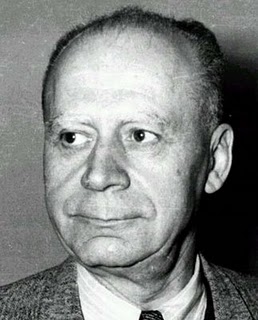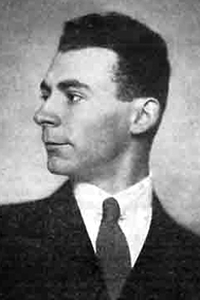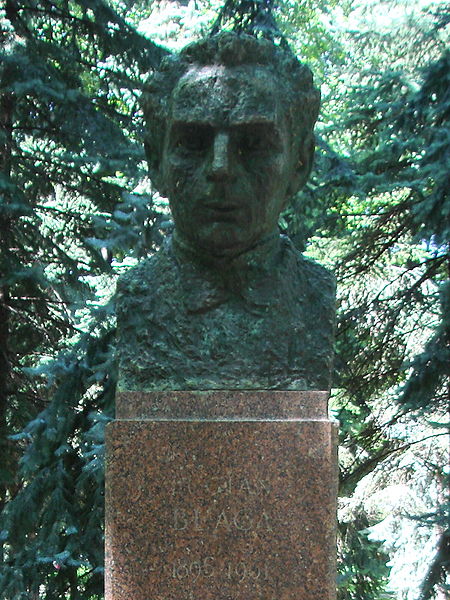<Back to Index>
- Philosopher and Writer Lucian Blaga, 1895
- Painter Abraham van Diepenbeeck, 1596
- Prime Minister of Portugal António Bernardo da Costa Cabral, 1803
PAGE SPONSOR



Lucian Blaga (May 9, 1895 – May 6, 1961) was a Romanian philosopher, poet, and playwright.
Lucian Blaga was a commanding personality of the Romanian culture of the inter - bellum period. He was a philosopher and writer higly acclaimed for his originality, a university professor and a diplomat. He was born on May 9, 1895 in Lancrăm, near Alba Iulia, Romania, his father being an Orthodox priest. He did not speak any words until he was four, and he later described his early childhood, in an autobiographical work "The Chronicle and the Song of Ages", as "under the sign of the incredible absence of word". In the poem "Self - Portrait" he describes himself : "Lucian Blaga is silent like a swan."
His elementary education was in Sebeş (1902 – 1906), after which he attended the "Andrei Şaguna" High School in Braşov (1906 – 1914), under the supervision of a relative, Iosif Blaga, who happened to be the author of the first Romanian treatise on the theory of drama. At the outbreak of the First World War, he began theological studies at Sibiu, where he graduated in 1917. He published his first Philosophy article on the Bergson theory of subjective time. From 1917 to 1920, he attended courses at the University of Vienna, where he studied philosophy and obtained his PhD.
Upon returning to the re-unified Romania, he contributed to the Romanian press in Transylvania, being the editor of the magazines Culture in Cluj and The Banat in Lugoj.
In 1926, he became involved in Romanian diplomacy, occupying successive posts at Romania's legations in Warsaw, Prague, Lisbon, Bern and Vienna. His political protector was the famous poet Octavian Goga, who occupied the chair of Prime Minister, Blaga being a relative of his wife. He was chosen a member of the Romanian Academy in 1937. His acceptance speech was entitled Elogiul satului românesc (In Praise of the Romanian Village).
In 1939, he became professor of cultural philosophy at the University of Cluj, temporarily located in Sibiu in the years following the Second Vienna Award. During his stay in Sibiu he edited, beginning in 1943, the magazine Saeculum, which was published annually.
He was dismissed from his university professor chair in 1948 because he refused to express his support to the new Communist Regime and he worked as librarian for the branch department (Cluj) of the History Institute of the Romanian Academy. He was banned from publishing new books and until 1960 he was allowed to publish only translations. He completed the translation of Faust, the masterpiece of Goethe, one of the German writers that influenced him most.
In 1956, he was nominated to the Nobel Prize for Literature on the proposal of Bazil Munteanu of France and Rosa del Conte of Italy, but it seems the idea was of Mircea Eliade. Still, the Romanian Communist government sent two emissaries to Sweden to protest the nomination, because Blaga was considered an idealist philosopher, and his poems were forbidden until 1962.
He died of cancer on May 6, 1961, and is buried in the countryside village cemetery of Lancrăm, Romania.
He was married to Cornelia (b. Brediceanu). They had a daughter, Dorli, her name being derivated from "dor", a noun coming from the Latin word "dolor" (pain).
The University of Sibiu bears his name today.